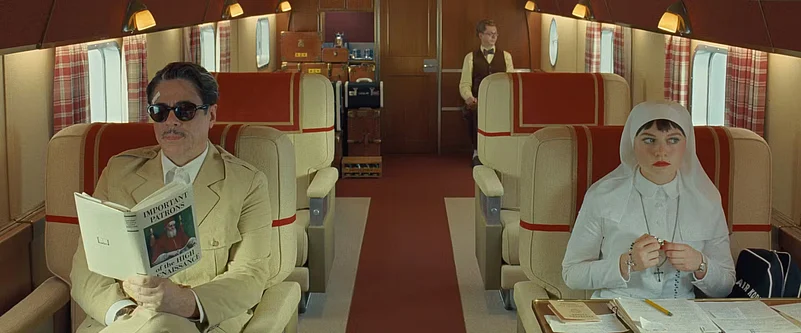In Wes Anderson’s cinematic universe, order and symmetry pulse with their own life-force. They drive the manner in which characters intertwine spatially. Anderson exerts a hyper-specific control over every perforation of a look and the rhythms within which characters exist. The rules of emotional engagement are also dramatically redrawn. The best of his films—Moonrise Kingdom (2012) or The Grand Budapest Hotel (2014)—combine his singular visual language with emotional valence. The weaker ones, like his previous film Asteroid City (2023), are too hemmed in by his obsessions—as awe-inducing eye-candy as emotionally static. Unfortunately, his latest The Phoenician Scheme is proof that Anderson isn’t quite willing to turn the boat in a different direction.
Set in a 1950s fictional Middle Eastern land, The Phoenician Scheme circles an industrialist tycoon, Anatole ‘Zsa-Zsa’ Korda (Benicio Del Toro) and his deluded attempts at maintaining his stronghold. The film opens with the sixth plane crash Korda has miraculously survived. There have been umpteen assassination attempts targeting him. Every time, he’s scraped out of life-threatening complications. Devoted to his empire, he’ll not backtrack or dial down his expansionist ideas. Drunk on profiteering, rampaging arms trade, several nations seek to take him down. But nothing seems to kill him or dent his pursuits. “I am not a citizen at all; I don’t need my human rights”, he haughtily declares.

Grandly tyrannical, Korda has no scruples about his strategies. He schemes and manipulates. Del Toro relishes the man's glib display of ambition and hubris. Fearless and convinced of his pull, Korda toys with settled agreements often, pushing wherever he can swindle. He's a single, unifying threat to his rivals, many of whom otherwise wouldn't even see eye to eye. Korda has bigger goals: to revamp, scale up and mount a massive infrastructure project across the desert. Named by Korda as his successor, his eldest daughter, Liesl (Mia Threapleton), a to-be nun, arrives at his mansion. She accepts his invitation because she is seeking answers. Korda instantly postures he knows nothing, that he cannot help her in the matter. However, Liesl isn’t one to abandon her intentions even while Korda sucks her into his enterprise. As someone describes her, she’s “pious but not plain”. The pipe-swigging Threapleton brings terrific bite and contained sass to Liesl. The daughter has barely any regard for her father, alarmed at his brazen avarice. She agrees to be his heir on trial run, after he manages to assemble his resources for his project.

Actors in Anderson's films are needed to play by a troupe's kooky syntax. They have to balance various degrees of detachment, prissiness and awkwardness. There’s a stiffness, an in-on-the joke elevated theatricality in the performative pitch. Anderson demands a strict tonal faithfulness, so much so it often counterintuitively broadens out individual shticks.
Among the ensemble stacked with A-listers, it’s Michael Cera fitting into Anderson-speak effortlessly. Cera brings a nervous, flitting asocial energy—all fumbling gestures and sudden boldness. He plays Bjorn, Korda’s squeaky new tutor more comfortable around insects—his object of study—than humans. While initially not as forthright as Farouk (Riz Ahmed), an Arab prince, Bjorn puts across to Liesl he desperately fancies her. His odd flirtations—at once carefully reserved and abruptly direct—are among the film’s most winning things. With Korda’s daughter and tutor joining him while he enlists investors, The Phoenician Scheme unravels as a globe-trotting adventure. The journey becomes an excuse to pile one after another the starriest of cameos, from Tom Hanks to Scarlett Johansson (both returning after Asteroid City) to Benedict Cumberbatch (fresh off Anderson’s The Wonderful Life of Henry Sugar). As Korda’s equally, if not more, diabolical half-brother, Cumberbatch sports massive, curling eyebrows, rendering manic momentum to the film’s climax.

The Phoenician Scheme’s compositions are as precisely realised as ever (Bruno Delbonnel lensing his first Anderson feature). The director and the cinematographer clearly have a blast with several set-pieces, even though not all of them land. However, watch out for an early scene with Korda’s brood of kids intervening in his plan layout. One of them, who's fixated on cross bows, disrupts until they are all hushed away. Delbonnel’s camera leaps from the balcony with the kids and Korda’s shoeboxes. Adam Stockhausen’s production design—an Anderson regular—takes full flight in the film’s spirit of invention and mechanics. There's also a vein of emotion aching to crack through the particular visual design.

Laced with Anderson’s typical dry humour, The Phoenician Scheme visibly struggles with piecing together compelling, cohesive threads for Korda, his family and past. Entire shady histories are suggested, including crimes of passion. At one point, a character wryly remarks, “Who licks who or whom is the source of most problems”. It seems to be a key to many backstories held off-view. Much of it is ultimately dismissed by Anderson’s screenplay. Thus, individual eccentricities, wounds don’t quite register. Tedium sets in, despite frantic action and busy plotting. Nothing about The Phoenician Scheme feels distinctive. Anderson seems too complacent, relying on how we expect him to orchestrate, rather than shift around. Nevertheless, Del Toro doesn’t put a foot wrong. Spectacular—by turns grotesque and surprisingly humane—he lends The Phoenician Scheme a beating heart.

















